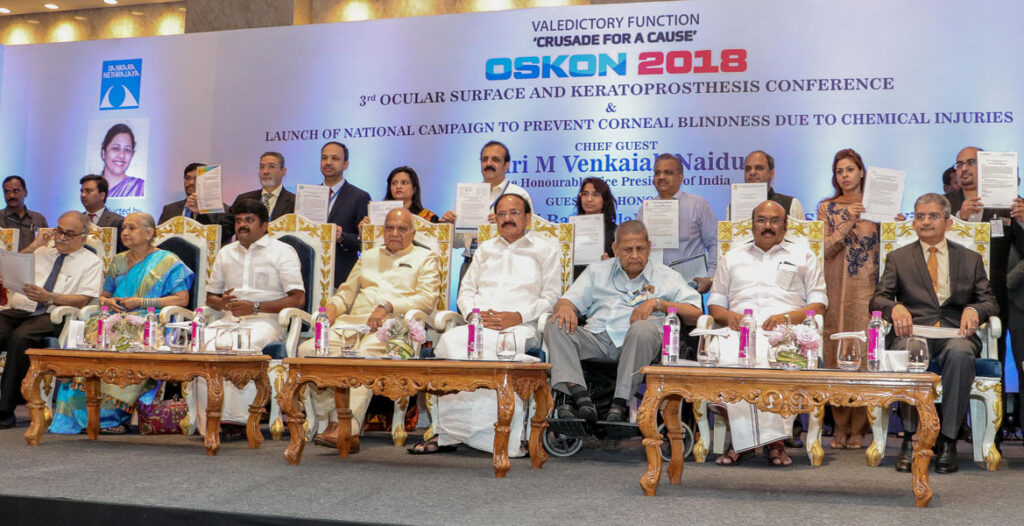Did you know chuna (slaked lime) that is used to spice up betel leaves has caused blindness in about 2,000 children in the last ten years? The Ocular Surface and Keratoprosthesis conference organised recently by Sankara Nethralaya in Chennai highlighted the extensive damage caused by the chuna powder to the eye.

Children are most susceptible to such accidents as they are the ones who are usually sent out to buy the chuna packet. The powder is sold in flimsy polythene packets for Rs. 1 at petty shops. The packet often breaks open when children play with it on their way home and the powder flies into their eyes. Despite a series of surgeries, vision is not restored to normalcy in most children, said Dr Geetha Iyer, senior consultant at Sankara Nethralaya and organising secretary of the conference.
Lime, which is high on alkalinity, disturbs the acid-alkali equilibrium. The chemicals erode the surface layer of the eye and affect the cornea, lens and the optic nerve. Most of the damage is done by the time the victim reaches a hospital. Huge amounts of water fail to flush out the lime from the eye due to its poor solubility in water. “All this is done in an operation theatre under general anaesthesia. We then put an amniotic membrane and wait for it to heal. Some may require up to four surgeries just for primary healing of the wound. Yet only partial restoration of vision happens,” she explained, adding that an injury such as this can derail a family. It can disrupt schooling, livelihood and can have a lifelong psychosocial and cosmetic impact.
Appeal to the government
Ophthalmologists representing the All India Ophthalmological Society, the Cornea Society of India and hospitals such as the LV Prasad Eye Hospitals, Hyderabad; Arvind Eye Hospitals, Madurai; and AIIMS, Delhi; and Rotary Club of Guindy, appealed for a ban on sale of chuna powder in plastic packets to the Vice President of India M Venkaiah Naidu, who presided over the conference. The appeal also urged the government to restrict sale of hydrochloric, sulphuric, nitric and carbolic acids, which are being used to attack women, because the damage to the eye in acid victims is also equally severe and may result in a lifetime of blindness if not treated effectively.
Congratulating the team of doctors for their expertise in eyecare services, Naidu remarked that he was also a patient of Sankara Nethralaya.
“Dr Prema Padmanabhan has treated me for cataract few years ago; thanks to her and the team, my eyesight is good.” He commended Dr S S Badrinath, Chairman emeritus of Sankara Nethralaya, for providing eyecare free of cost to the poor, saying that his initials ‘S S’ stand for ‘Service to Society’.
The Vice President promised “to take the appeal of the ophthalmologists to Parliament and all concerned authorities and ensure safer packaging of chuna and to regulate sale of acids for household purposes.” He condemned the act of throwing acid as vengeful and atrocious.
Tamil Nadu Governor Banwarilal Purohit, State Health Minister Vijay Bhasker and Fisheries Minister D Jayakumar were also present at the event.
Rotary’s role
Rotary Club of Guindy, D 3232, supports the Dr G Seethalakshmi Memorial Clinic for Ocular Surface Disorders in Sankara Nethralaya and has provided sophisticated equipment and consumables worth $48,500 through a global grant with RCs Alorstar and Penang, D 3300, Malaysia, and TRF. The clinic specialises in the treatment of ailments caused by chemical substances such as chuna and acids. It is one of the two hospitals in India which provides highly specialised treatment called the OOKP (Osteo-odonto-keratoprosthesis) that uses a patient’s own tooth in the eye to restore vision in most severe cases of corneal and ocular surface disorders.
“We have a long and continuous association with the hospital,” said L Neelakantan, a past president of the club. A global grant with RC Niles Fremont, D 9170, California, and TRF has facilitated the club with $97,500 to sponsor surgeries for 800 eye patients. The hospital operates a mobile surgery unit that travels to the peripheries of Chennai and perform surgeries at the doorsteps of the villagers.
Treatment is provided free for the poor at the hospital which “wants to associate with other Rotary clubs too to support its endeavour in extending eyecare for the underprivileged,” he said.
A one-minute video creating awareness on how chuna can blind the eye was sponsored by the club and was released at the conference. An advertisement sponsored by the club was also promoted in the print media across the State to create awareness about the harmful effects of chuna and acids on the eye.






